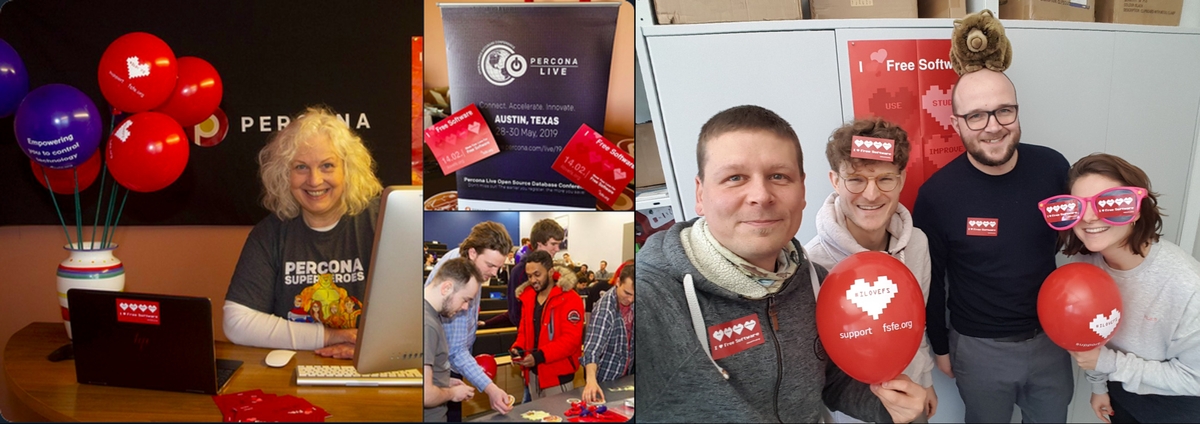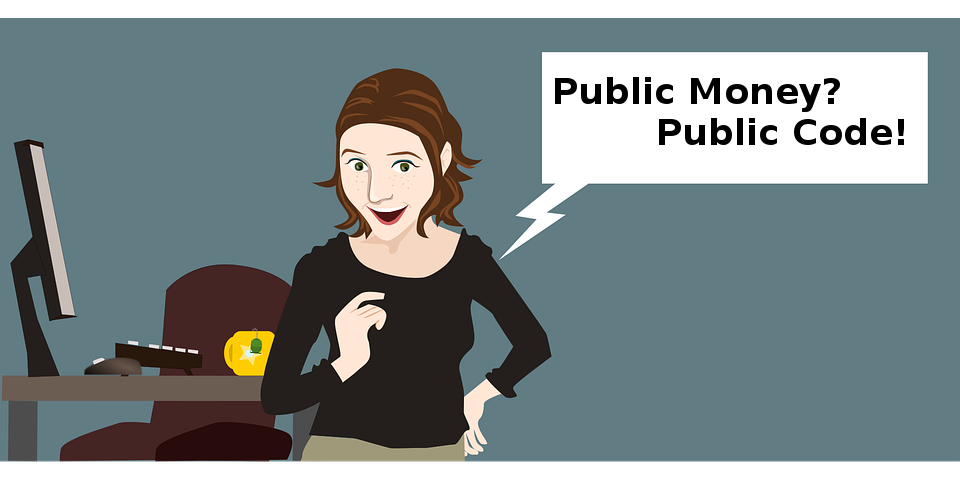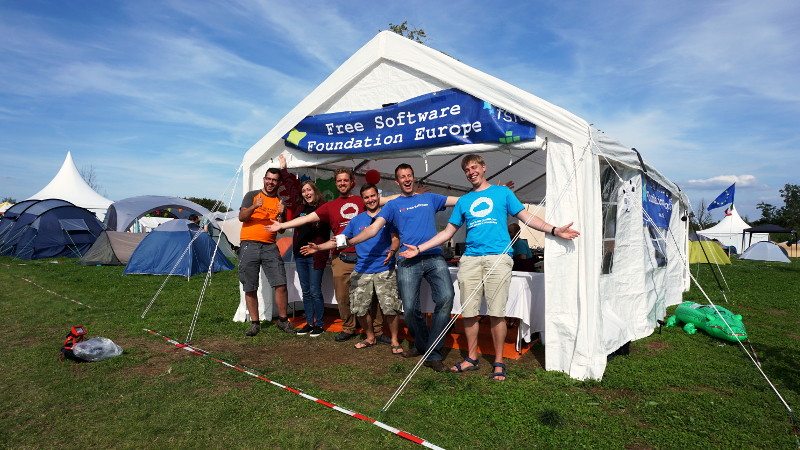Cory Doctorow +++ (pre-) FOSDEM +++ 36C3
2020 is not just a new year, it is the dawn of a new decade. With more and more automated systems run by software, a political representation of freedom is more needed than ever. Read in our January Newsletter about why Cory Doctorow supports the FSFE financially and why you should do so too. Read about our upcoming FOSDEM activities including our pre-FOSDEM meeting and reflections on our presence at the Chaos Communication Congress. Also we have a new Software Freedom Podcast with Harald Welte and reports from our community.
FSFE needs you
2019 was a year full of successes for the FSFE and for Software freedom in Europe accordingly. The Parliament of Asturias has signed our open letter demanding public code, the biggest conservative party in Europe -- the german CDU -- decided to foster Free Software, we managed to get an exclusion for Free Software in the EU copyright reform, and we have many more success stories to tell. But while we spent our time spreading software freedom in such a successful way, we missed one goal to achieve, that is having enough donations for 2020.
Your financial support is crucial for our work! A secure financial basis gives us the ability to solely concentrate on our mission to spread software freedom in Europe - independent, professional and consistent.
Join the FSFE as a supporter or make a one-time donation.
Every 1 Euro brings us closer to this momentum! Every 15 Euro allow us to send a package full of information material to a Free Software supporter in Europe. Every 50 Euro help us to pay our infrastructure and every 150 euro enable us to support travel and accommodation costs for a volunteer from Europe to participate in one of the FSFE community events like our hack-a-thons.
By the way: Cory Doctorow, author of many digital rights-related books and co-editor of the blog Boing-Boing put the FSFE on the BoingBoing's charitable giving guide and explains:
Software has eaten the world, and software freedom is increasingly synonymous with human freedom. In Europe, far-right parties and authoritarians are inheriting a constellation of gadgets and devices that are "defective by design," built to allow corporations spy on and control their owners -- and those thugs are contemplating how they can use those companies' extraordinary powers to put whole populations under their thumbs. Free software in Europe, free software everywhere!
Join Cory Doctorow. Join the FSFE!
FSFE goes FOSDEM
Europeans biggest Free Software conference 'FOSDEM' is taking place on 1-2 February in Brussels. More then 7.000 participants are expected to come and the FSFE will be present with multiple talks and a booth.
Matthias Kirschner, President of the FSFE, gives a talk about "The core values of software freedom" and a lightning talk about "Civil society needs Free Software hackers". Max Mehl, Programme Manager of the FSFE, talks about REUSE in "Go REUSE to license your code" and the FSFE's Deputy Coordinator France, Vincent Lequertier, talks about "Putting Artificial Intelligence back into people's hands".
As every year we will have a booth at FOSDEM, but unlike in previous editions, this time you will find us on top level of building K - just upstairs from where it was in the past years.
Pass by anytime to have a chat with us, give us your feedback on our latest activities or proposals for further engagement. You can enjoy our latest merchandise and promotion material, for example our new multilingual I love Free Software T-Shirts.
On Saturday night we invite you to come together after FOSDEM to have a social evening with our community. The location will be announced at the booth the very same day. Pass by and find out. Looking forward meeting you!
And if you arrive early, you might also be interested in joining our Pre-FOSDEM Community Meeting (see below).
Bonnie Mehring and Erik Albers get interviewed by Komm:On at the FSFE booth at 36C3
Support our work with a donation
Do not miss: upcoming events with the FSFE
The first self-organised FSFE event in 2020 will be our Pre-FOSDEM Community Meeting. In this meeting, the FSFE will bring together the key Free Software groups of Europe on Friday before FOSDEM to get to know each other and to get an overview about interesting activities of Free Software groups from all over Europe. The event takes place on 31 January 2020, 13:30 to 19:00 at MundoB, Edinburgh Street 26, in Brussels. Attendance is gratis but capacities are limited and
registration is required.
As written above, the FSFE will be prominently represented at FOSDEM with multiple talks, a full-packed information-booth and social events in the evening.
I love Free Software: On 14 February the Free Software community celebrates again the
I love Free Software Day. A day dedicated to say "Thank you" to all Free Software and their contributors. Save the date now and stay tuned for more news on the 2020 edition.
Save the date: On 4 May 2020 the FSFE is inviting for an event about "Digital sovereignty and modernising public aministrations" in the Kalkscheune Berlin (in German). Attendance is gratis but
registration is required.
What have we done? Inside and Outside the FSFE
The FSFE was present at the 36th Chaos Communication Camp (36C3) and one of the main organisers of the cluster "about:freedom" - a cluster that brings together civil society organisations with a focus on digital rights and Free Software advocacy at European's biggest hacking-related conference. In the four days of the event we had 19 self-organized session by the FSFE assembly, counted hundreds of visitors at our booth and we have created a cosy space for freedom activists to come together. On this occasion, Bonnie Mehring and Erik Albers have been
interviewed by Komm:On in their report about the congress. Read our
full report for more details.
The FSFE booth at 36C3
In December
we published our Software Freedom Podcast #3 about Free Software in the mobile phone communication featuring Harald Welte. Harald discusses with us his current projects regarding mobile phone communication and the general status of Free Software in this area.
3 new organisations signed
our open letter demanding public code: Association Naga, RevLibre and GEN Europe
Alexander Sander, the FSFE's Public Policy Manager
wrote a comment on Netzpolitik.org (in German) on the recent decision of Germany's conservative party CDU to foster Free Software and where to go on from this decision.
Alexander Sander was giving a talk about our "Public Money? Public Code!" at the
GNU Health CON in Liege, Belgium and also in Utrecht (NL) at the
"Online Participatie in Actie! Congress"
The FSFE was present with a booth at the NLLGG meeting in Utrecht.
Get Active
If you are already supporting the FSFE, then let other people know why you do so. Write a toot or an email, chat with your friends or mention it in your working group, let them know why software freedom matters to you and why you decided to support the cause with a donation for the FSFE. Thank you so much!
Contribute to our newsletter
If you would like to share any thoughts, pictures, or news, send them to us. As always, the address is newsletter@fsfe.org. We're looking forward to hearing from you!
If you also want to support us and our work, join our community and support us with a donation or a monthly contribution.
Thanks to our community, all the volunteers, supporters and donors who make our work possible. And thanks to our translators, who enable you to read this newsletter in your native languages.
Best Regards,
Erik Albers
Support our work with a donation
Support FSFE
 Free Software users all over the world on #ilovefs day
Free Software users all over the world on #ilovefs day
 Details and formal requirements
Details and formal requirements Already looking forward working with you: Volunteers from all over Europe.
Already looking forward working with you: Volunteers from all over Europe.